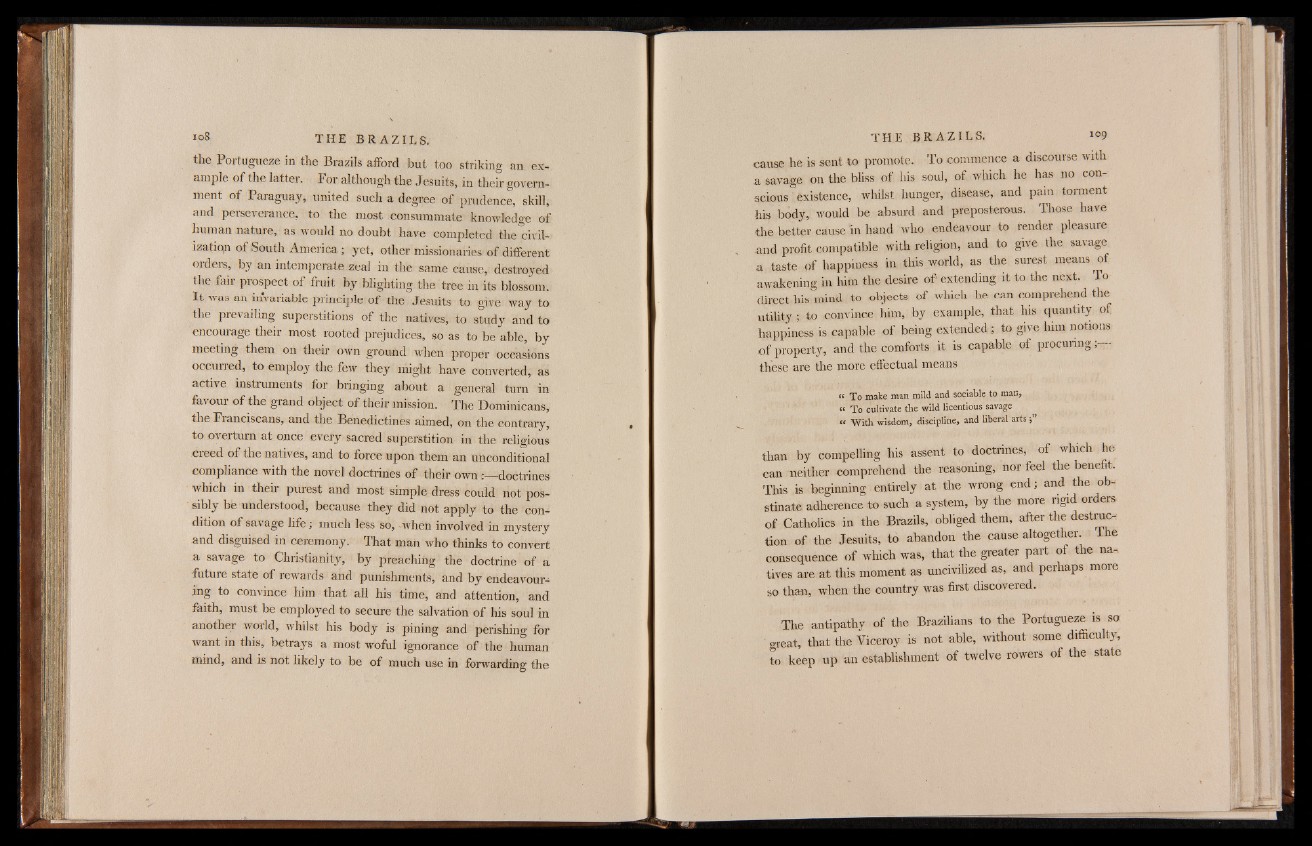
the Portuguese in the Brazils afford but too striking an example
of the latter. For although the Jesuits, in their government
of Paraguay, united such a degree of prudence, skill,
and perseverance, to the most consummate knowledge of
human nature, as would no doubt have completed the civilization
of South America; yet, other missionaries of different
orders, by an intemperate zeal in the same cause, destroyed
the fair prospect of fruit by blighting the tree in its blossom.
I t was an invariable principle of the Jesuits to give way to
the prevailing superstitions of the natives, to study and to
encourage their most rooted prejudices, so as to be able, by
meeting them on their own ground when proper occasions
occurred, to employ the few they might have converted, as
active instruments for bringing about a general turn in
favour of the grand object of their mission. The Dominicans,
the Franciscans, and the Benedictines aimed, on the contrary,
to overturn at once every sacred superstition in the religious
creed of the natives, and to force upon them an unconditional
compliance with the novel doctrines of their own; doctrines
which in their purest and most simple dress could not possibly
be understood, because they did not apply to the condition
of savage life; much less so, -when involved in mystery
and disguised in ceremony. That man who thinks to convert
a savage to Christianity, by preaching the doctrine of a
future state of rewards and punishments, and by endeavouring
to convince him that all his time, and attention, and
faith, must be employed to secure the salvation of his soul in
another world, whilst his body is pining and perishing for
want in this, betrays a most woful ignorance of the human
mind, and is not likely to be of much use in forwarding the
cause he is sent to promote. To commence a discourse with
a savage on the bliss of his soul, of which he has no conscious
existence, whilst hunger, disease, and pam torment
bis body, would be absurd and preposterous. Those have
the better cause in hand who endeavour to render pleasure
and profit compatible with religion, and to give the savage
a taste of happiness in this world, as the surest means of
awakening in him the desire of extending it to the next. To
direct his mind to objects of which he can comprehend the
utility; to convince him, by example, that his quantity of
happiness is capable of being extended ; to give him notions
of property, and the comforts it is capable of procuring;—
these are the more effectual means
<( To make man mild and sociable to man,
( t To cultivate the wild licentious savage
*< With wisdom, discipline, and liberal arts *,
than by compelling his assent to doctrines, of which he
can neither comprehend the reasoning, nor feel the benefit.
This is beginning entirely at the wrong e n d ; and the obstinate
adherence to such a system, by the more rigid orders
of Catholics in the Brazils, obliged them, after the destruction
of the Jesuits, to abandon the cause altogether. The
consequence of which was, that the greater part of the natives
are at this moment as uncivilized as, and perhaps more
so than, when the country was first discovered.
The antipathy of the Brazilians to the Portugueze is so
oreat, that the Viceroy is not able, without some difficulty,
to keep up an establishment of twelve rowers of the state